 Psalm 139:7-12 (ESV) - Where shall I go from your Spirit? Or where shall I flee from your presence? If I ascend to heaven, you are there! If I make my bed in Sheol, you are there! If I take the wings of the morning and dwell in the uttermost parts of the sea, even there your hand shall lead me, and your right hand shall hold me. If I say, "Surely the darkness shall cover me, and the light about me be night," even the darkness is not dark to you; the night is bright as the day, for darkness is as light with you.
0 Comments
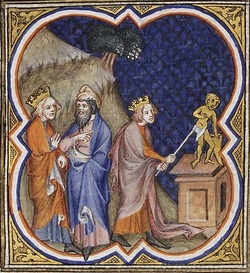 Azariah prompts Asa's reforms, Bible Historiale 2 Chronicles 15:1-2 (ESV) “The Spirit of God came upon Azariah the son of Oded, and he went out to meet Asa and said to him, 'Hear me, Asa, and all Judah and Benjamin: The LORD is with you while you are with him. If you seek him, he will be found by you, but if you forsake him, he will forsake you.'” 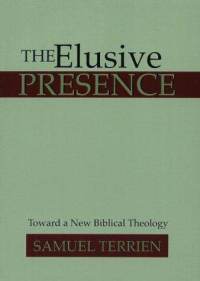 Excerpt of Covenant sections Terrien points to the differences in interpretation, worldview, and religion between Judaism and Christianity to state that the term “biblical” is ambiguous (22)1. To support this claim, he shows that national Israel herself had a diverse response to her own divine history, instead of a homogeneous understanding of the Hebrew covenant, by claiming that each new covenant in the Old Testament was a mythical re-envisioning of God's prerogatives based on outside cultural influences. Further, Terrien claims that most Hebrews did not think in terms of Covenant since the term is absent from many of the Old Testament books.  from "The Tabernacle Experience" Exodus 40:1-7. “The LORD spoke to Moses, saying, 'On the first day of the first month you shall erect the tabernacle of the tent of meeting. And you shall put in it the ark of the testimony, and you shall screen the ark with the veil.' 34-36 Then the cloud covered the tent of meeting, and the glory of the LORD filled the tabernacle. And Moses was not able to enter the tent of meeting because the cloud settled on it, and the glory of the LORD filled the tabernacle. Throughout all their journeys, whenever the cloud was taken up from over the tabernacle, the people of Israel would set out.”  “The Kingdom of God” has fallen out of favor amongst modern scholars as the primary or sole theme of the Old Testament. However, Patrick still sees the Kingdom of God theme as a valid solo theme. He opens by disagreeing with the argumentation that the Kingdom theme should displaced by, or combined with, other themes simply because the exact phrase “Kingdom of God” has minimal usage within the Old Testament. Instead, Patrick argues that the idea of the Kingdom of God clearly pervades the Scriptures despite the lack of the term itself. To make his argument that the Kingdom of God should remain as the primary theme, Patrick points to the teachings of Jesus' in the NT, stating that this should raise the Kingdom theme to the level of a heuristic and that the antecedents of this heuristic can be clearly traced to the Old Testament.  Isaiah 6:1 (ESV) In the year that King Uzziah died I saw the Lord sitting upon a throne, high and lifted up; and the train of his robe filled the temple. (6:4) And the foundations of the thresholds shook at the voice of him who called, and the house was filled with smoke. (6:5) And I said: "Woe is me! For I am lost; for I am a man of unclean lips, and I dwell in the midst of a people of unclean lips; for my eyes have seen the King, the LORD of hosts!" (6:8) And I heard the voice of the Lord saying, "Whom shall I send, and who will go for us?" Then I said, "Here I am! Send me." 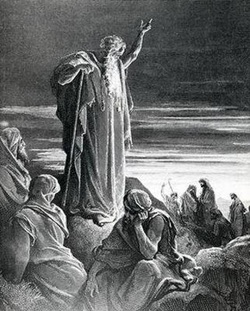 Ezekiel's Preaching - Gustav Dore In warfare during the Ancient Near East (ANE), warring states typically also meant warring religions due to local gods and tribal deities. Thus, the victory of a certain people was often translated into the victory of their god over the vanquished people's god as well. With this background in mind, Luc argues that Ezekiel did not see the impending Babylonian exile as a political problem, but a theological problem. Ezekiel was concerned first and foremost with God's name and that Israel's history resulted from God's concern for His own name. Luc demonstrates that Israel only survived many bouts of apostasy because God withheld His wrath “for the sake of my name” and “...to keep his name from being profaned 'in the yes of the nations'” (Luc, 138).  Michelangelo's David 2 Samuel 7:3-5 (ESV) And Nathan said to the king, "Go, do all that is in your heart, for the LORD is with you." But that same night the word of the LORD came to Nathan, "Go and tell my servant David, 'Thus says the LORD: Would you build me a house to dwell in? (7:11b) Moreover, the LORD declares to you that the LORD will make you a house.” 2 Samuel 7:12-16 “When your days are fulfilled and you lie down with your fathers, I will raise up your offspring after you, who shall come from your body, and I will establish his kingdom. He shall build a house for my name, and I will establish the throne of his kingdom forever. I will be to him a father, and he shall be to me a son. When he commits iniquity, I will discipline him with the rod of men, with the stripes of the sons of men, but my steadfast love will not depart from him, as I took it from Saul, whom I put away from before you. And your house and your kingdom shall be made sure forever before me. Your throne shall be established forever.'”  Ark of the Covenant After the Fall, God's relationship with people has been expressed, and governed through covenants and laws. Since in the Old Testament the covenant rests on God's promise and lies at the heart of the biblical notion of history (Dyrness, 113), the interplay of covenant and Law play a crucial role within Israelite history, and therefore modern Christianity despite their “antiquated” feel to modern readers. Dyrness quickly dismisses conclusions of the Documentary Hypothesis theory that Covenants were developed later and read back into the final composition of the Law using history to show “It was seen very early that the idea of covenant was an extremely important means of regulating behavior between peoples, especially in the area of international relations” (114). 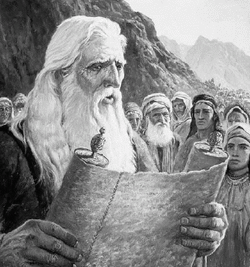 God's Suzerain-Vassal Treaty Exodus 19:1-3 (ESV) On the third new moon after the people of Israel had gone out of the land of Egypt, on that day they came into the wilderness of Sinai. They set out from Rephidim and came into the wilderness of Sinai, and they encamped in the wilderness. There Israel encamped before the mountain, while Moses went up to God. The LORD called to him out of the mountain, saying, "Thus you shall say to the house of Jacob, and tell the people of Israel:...” Exodus 20:1 “And God spoke all these words, saying, 'I am the LORD your God, who brought you out of the land of Egypt, out of the house of slavery. "You shall have no other gods before me." 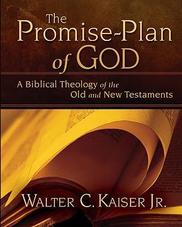 Kaiser continues to promote the Promise Plan of God as the constant theme of scripture throughout the prophetic books. While few words or phrases consistently characterize the promise theme throughout all the prophets as was the case in earlier Old Testament works, Kaiser reveals how the “both/and” nature of prophecy actually integrates with God's promise-plan of redemption. For prophecy was not so much prediction as it was embracing “...the historical means employed for keeping that purpose [promise] alive over the centuries while it awaited the final fulfillment” (Kaiser, 153). That is to say, prophecy was a melding of the promise, the means, and the result.  clouds of heaven...one like a son of man (7:1) “In the first year of Belshazzar king of Babylon, Daniel saw a dream and visions of his head as he lay in his bed. Then he wrote down the dream and told the sum of the matter. Daniel 7:13-14 (ESV) "I saw in the night visions, and behold, with the clouds of heaven there came one like a son of man, and he came to the Ancient of Days and was presented before him. And to him was given dominion and glory and a kingdom, that all peoples, nations, and languages should serve him; his dominion is an everlasting dominion, which shall not pass away, and his kingdom one that shall not be destroyed.”  (9:3) [Israelites] stood up in their place and read from the Book of the Law of the LORD their God for a quarter of the day; for another quarter of it they made confession and worshiped the LORD their God. (9:5) Then the Levites...said, "Stand up and bless the LORD your God from everlasting to everlasting. Blessed be your glorious name, which is exalted above all blessing and praise. Nehemiah 9:7 (ESV) “You are the LORD, the God who chose Abram and brought him out of Ur of the Chaldeans and gave him the name Abraham. You found his heart faithful before you, and made with him the covenant to give to his offspring the land of the Canaanite, ...And you have kept your promise, for you are righteous."  Pierce argues that if an ethic and national future exists for the state of Israel, then it isn't based upon God's “unconditional” covenants with Abraham and David (the traditional Dispensational view). Based upon his exegetical study, he argues that none of the covenants in fact are unconditional. Instead, each of the covenants is presented in a three-fold pattern where: 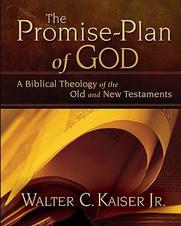 Kaiser promotes that the Promise Plan of God is the constant theme of scripture and begins by showing the origin of that theme in the primeval prologue of Genesis. There it is revealed that in the theology of the Torah, the word “blessing” (which appears in the book of Genesis 88 times alone) represents the promise. Kaiser points out that the God's plan of blessing was universal in nature even before the Genesis 12:3 announcement that “...the role of the patriarchs and their offspring would play in carrying out this mission for 'all the families of the earth'” (Kaiser, 36). 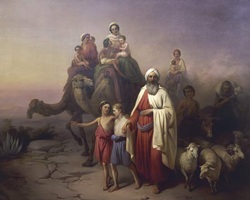 The March of Abraham, by József Molnár Genesis 12:1-4 (ESV) “Now the LORD said to Abram, 'Go from your country and your kindred and your father's house to the land that I will show you. And I will make of you a great nation, and I will bless you and make your name great, so that you will be a blessing. I will bless those who bless you, and him who dishonors you I will curse, and in you all the families of the earth shall be blessed.' So Abram went, as the LORD had told him, and Lot went with him. Abram was seventy-five years old when he departed from Haran.” 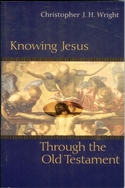 Christopher Wright, an Old Testament scholar and author, has written an excellent book studying Jesus as found in the Old Testament. Here an overview will be presented of each chapter in the book:
|
AuthorBrett Yardley: Categories
All
Archives
January 2019
|

